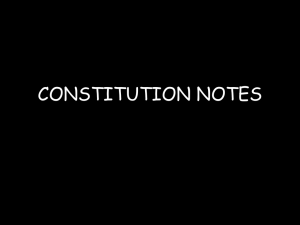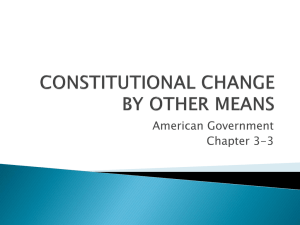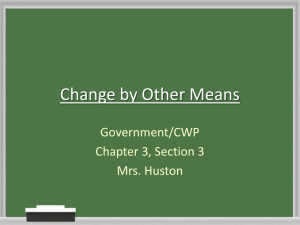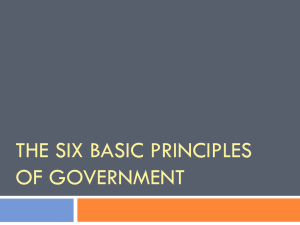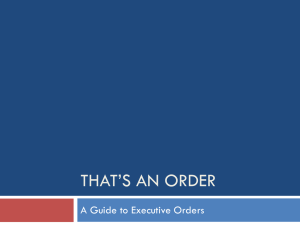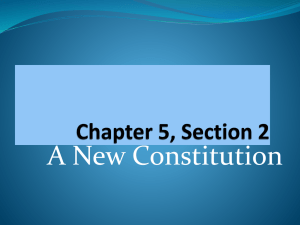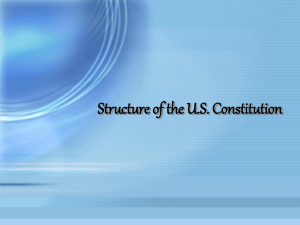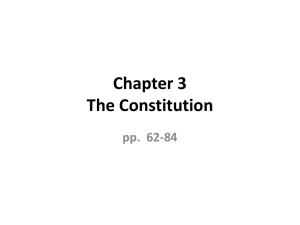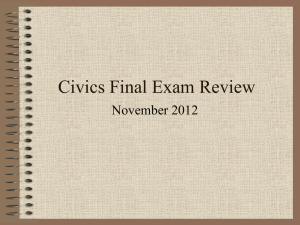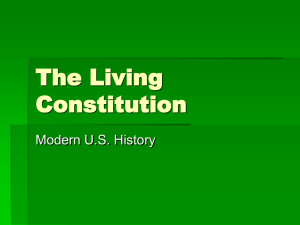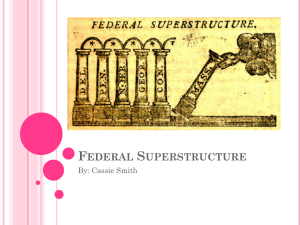Chapter 3 PowerPoint
advertisement
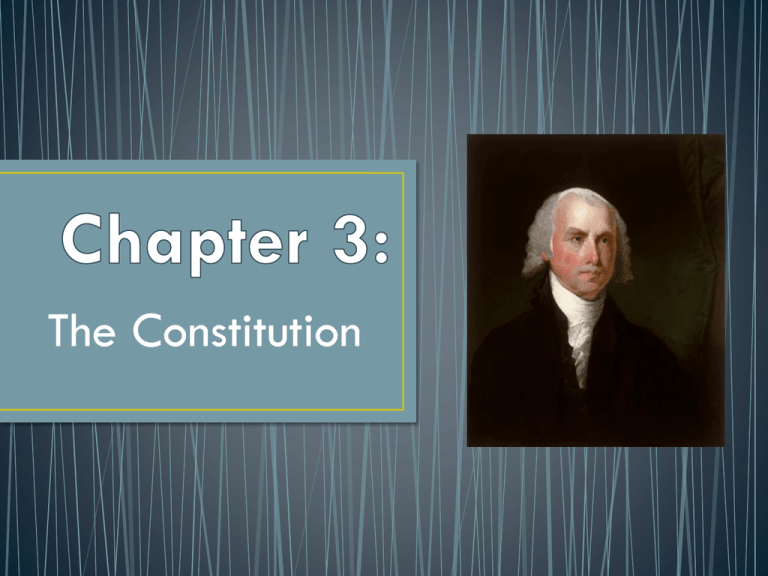
The Constitution How has the Constitution lasted through changing times? “These principles form the bright constellations which has gone before us and guided our steps through an age of revolution and reformation” (Thomas Jefferson, 1801) • Written in 1787, took effect in 1789 • “living constitution” • Lays out basic framework and procedures of our government, sets out limits within which government can conduct itself • Matters of basic principle • Strength? • Organization • Preamble • Articles (7) • Amendments (27) • 1. Popular Sovereignty • People are sovereign—only source for any and all government power • Important part of Preamble (We the people…) • 2. Limited Government • Government may do only those things that people have given it power to do • Related to popular sovereignty—government must obey the law • Constitutionalism & rule of law • John Locke • Tests • Average: 86 • Highest: 104 • Chapter 3 Quiz, next Monday (9/22) • Current Events • Kyce, Andres • 9/18: David, Diego, Nicholas, Michael • Position Paper • 3. Separation of powers • Power distributed among three distinct and separate branches • State constitutions influenced (Massachusetts) • “The accumulation of all powers, legislative, executive, and judiciary, in the same hands, whether of one, a few, or many…may justly be pronounced the very definition of tyranny” (Federalist No. 47) • 4. Checks and Balances • Each branch is subject to a number of constitutional checks (restraints) by the other branches • President veto power; Congressional override • Ex: Nominations to Supreme Court • Goal: preventing “an unjust combination of a majority” • Partisan friction? • Divided government • 5. Judicial Review • An aspect of checks and balances • Definition: power of a court to determine the constitutionality of a governmental action • “power to declare unconstitutional” • Who holds this power? • Not explicitly in Constitution • Federalist No. 51 (Madison): judicial power as one of “auxiliary precautions” • Federalist No. 78 (Hamilton): “the interpretation of the laws is the proper and peculiar province of the courts” • To date, Supreme Court has decided some 150 cases in which it found some part of an act by Congress to be unconstitutional • As well as hundreds of actions by States and local ordinances • Supreme Court established power of judicial review • Background • President John Adams did not win second term; appointed large number of political appointments • New President Jefferson ordered his Secretary of State, James Madison, not to deliver the paperwork • William Marbury denied new job, petitioned Supreme Court for writ of mandamus to force Madison to deliver commission • Decision • Court ruled unanimously (4-0) that Marbury had right to commission, but that the court did not have power to force Madison to deliver commission • Concluded that issuing writ of mandamus did not fall under their jurisdiction according to Constitution—determined Judiciary Act of 1789 as unconstitutional • 6. Federalism • National government holds some powers and others belong to the states • Definition: division of power among a central government and regional governments • Came to Constitution out of both necessity and experience • Why? How was it a “compromise”? • Framers dedication to concept of limited government • 1) feared government power as threat to individual liberty • 2) believed that government power must be restrained • 3) federalism prevents abuse of power by government • “The different governments will control each other, at the same time that each will be controlled by itself” (Federalist No. 51, Madison) • • • • • • “Constitution Group Assignment” Group 1: Pierce, Nicholas, Christian, Mills Group 2: Patrick, Andres, Ryan, Aric Group 3: Michael, Jose, Jonathan , Tyler Group 4: William, Diego, Evan, Cooper Group 5: Kyce, David, Douglas, Bao-Tri • Constitution of the United States has now been enforced for more than 200 years—longer than the written constitution of any other nation • How has it continued to remain relevant? • 1) by formal amendment • 2) by other informal means • Article V: two methods of proposal and two methods of ratification • First Method – 2/3rds vote by each house of Congress and ratified by 3/4ths of state legislatures • 26/27 amendments adopted in this manner • Second Method – proposed by Congress and ratified by state conventions (3/4) • 21st amendment adopted in this way • Third Method – proposed by national convention, called by Congress at the request of 2/3 of the state legislature • Fourth Method – proposed by a convention and ratified by conventions in ¾ of the states • Federal nature of our government explains the amendment process • Some criticize sending proposals to State legislatures over ratifying conventions • Hawke v. Smith 1920 • Supreme Court held that a State cannot require an amendment proposed by Congress to be approved by a vote of the people before it can be ratified by that State’s legislature • Only restriction:” “No state without its consent, shall be deprived of its equal Suffrage in the Senate” • Over 12,000 joint resolutions for amendments proposed • 33 sent to the states • 27 ratified • Ex: Giving Congress power to regulate child labor • Bill of Rights • Added less than three years after writing of Constitution • Many people had only supported Constitution on condition of Bill of Rights being added later • Grant constitutional guarantees of freedom of belief and expression, of freedom and security of the person, and of fair and equal treatment under law • The Later Amendments • Often grew out of particular set of circumstances • Ex: 11th Amendment, no State may be sued in the federal courts by a citizen of another State or by a citizen of any foreign state • Chisholm v. Georgia • Ex: 13th Amendment, abolishment of slavery • Civil War • Most recent amendment, the 27th, written by James Madison • Forbids members of Congress from raising own pay • Which amendment affects you the most today? Why? • Which amendment affects you the least today? Why? • Some people have criticized the ratification of amendments by State legislatures instead of by popularly elected delegates—a) why has this process been criticized?; b) Do you agree? Why or why not? • Skeletal nature of amendments guarantees interpretation & flexibility • How does this constitutional change by means other than formal amendment take place? • 1) passage of basic legislation by Congress • 2) actions taken by the President • 3) key decisions of the Supreme Court • 4) activities of political parties • 5) customs and usage • Congress has been a major agent of constitutional change • 1) passed number of laws clarifying several of Constitution’s brief provisions • “adding flesh to the bone” • Ex: Article III, Section 1: Constitution provides “one supreme Court, and…such inferior Courts as the Congress may from time to time ordain and establish” • 2) Congress has added to the Constitution by the way it has used many of its powers • Ex: Constitution gives Congress the expressed power to regulate foreign and interstate commerce • The way that Presidents have used their powers has contributed to growth of Constitution • Ex: Presidents making war without declaration of war by Congress • Executive agreements vs. treaties • Article II, Section I: “executive power” • Nation’s courts, especially the US Supreme Court, interpret and apply the Constitution in many cases they hear • Ex: Marbury v. Madison • The Supreme Court is “a constitutional convention in continuous session” (Woodrow Wilson) • Despite no mention of them in Constitution, political parties have had major impact on constitutional change • Framers against political parties • Washington warned against “the baneful effects of the spirit of party” • Created formal presidential nomination process • Converted electoral college to “rubber stamper” • By custom, the heads of the 15 executive departments form the Cabinet (advisory body to President) • Senatorial Courtesy • Custom that the Senate will approve only those presidential appointees who are acceptable to the senators of the President’s party from the State involved • From informal to formal • 22nd Amendment: limiting the President to two terms
